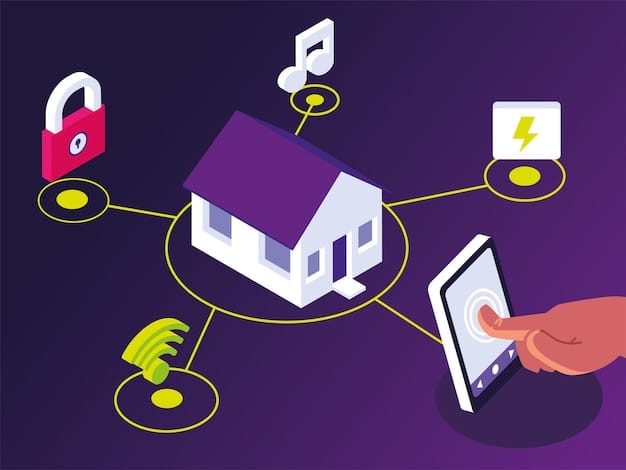Blockchain and Real Estate: Tokenization for US Market Efficiency

Blockchain and Real Estate: How Tokenization Can Streamline Transactions in the US Market by fractionalizing ownership, reducing paperwork, and increasing liquidity. This innovative approach promises to revolutionize property investment and management in the United States.
The intersection of blockchain technology and the real estate sector is creating unprecedented opportunities for innovation, particularly through tokenization. Blockchain and Real Estate: How Tokenization Can Streamline Transactions in the US Market is rapidly gaining traction. Let’s dive in to understand its transformative potential.
This article explores how tokenization can revolutionize real estate transactions in the US market, making them more efficient, transparent, and accessible.
Understanding Blockchain and Tokenization in Real Estate
To fully appreciate the impact of tokenization on the real estate market, it’s crucial to understand the underlying concepts of blockchain and tokenization.
What is Blockchain Technology?
Blockchain is a decentralized, distributed, and immutable ledger that records transactions across many computers. This technology ensures transparency, security, and trust, making it ideal for various applications beyond cryptocurrencies.
Tokenization Explained
Tokenization is the process of converting rights to an asset into a digital token that can be traded on a blockchain. In the context of real estate, tokenization involves representing ownership of a property as digital tokens. This allows for fractional ownership, increased liquidity, and streamlined transactions.
Consider these potential benefits:
- Fractional Ownership: Allows multiple investors to own shares of a single property.
- Increased Liquidity: Makes it easier to buy and sell real estate assets.
- Reduced Transaction Costs: Eliminates intermediaries, lowering fees and paperwork.
By leveraging blockchain and tokenization, the real estate market can become more accessible, efficient, and transparent, attracting a broader range of investors and transforming traditional investment models.

Benefits of Tokenization in US Real Estate Transactions
Tokenization brings a multitude of advantages to US real estate transactions, streamlining processes and unlocking new opportunities for investors.
Enhanced Liquidity
One of the most significant benefits of tokenization is enhanced liquidity. Traditionally, real estate investments are illiquid, meaning they cannot be easily converted into cash. Tokenization solves this by enabling fractional ownership, making it simpler for investors to buy and sell shares of a property.
Reduced Costs and Increased Efficiency
Tokenization reduces costs by eliminating intermediaries and automating processes. Blockchain technology ensures transparency and security, minimizing the need for extensive paperwork and legal fees.
Key benefits include:
- Lower Transaction Fees: Reduced reliance on traditional intermediaries like brokers and notaries.
- Faster Closing Times: Automated processes speed up the transaction process.
- Simplified Regulatory Compliance: Blockchain’s transparency aids in regulatory reporting.
By reducing costs and increasing efficiency, tokenization makes real estate investments more attractive and accessible to a broader audience. This modernization aligns with the evolving needs of the US market, where efficiency and transparency are highly valued.
Challenges and Considerations for Tokenized Real Estate
While the potential of tokenized real estate is immense, there are challenges and considerations that need to be addressed for successful implementation. Understanding these hurdles is crucial for stakeholders looking to navigate this evolving landscape.
Regulatory Uncertainty
One of the primary challenges is regulatory uncertainty. The legal and regulatory framework for tokenized assets is still evolving, and there is a lack of clear guidelines on how these assets should be treated. This uncertainty can create hesitation among investors and developers.
Technology and Security Risks
Tokenization relies on blockchain technology, which is susceptible to security risks such as hacking and smart contract vulnerabilities. Ensuring the security of these digital assets is paramount to maintaining investor confidence.
Mitigation strategies include:
- Implementing robust security protocols and smart contract audits.
- Working with experienced blockchain developers and cybersecurity experts.
- Staying informed about the latest security threats and vulnerabilities.
Addressing these challenges and considerations is essential to fostering a secure and reliable ecosystem for tokenized real estate in the US market.

Successful Examples of Blockchain-Based Real Estate Platforms
Several companies are already leveraging blockchain to transform real estate transactions. Examining these examples provides valuable insights into the practical applications and benefits of this technology.
RealT
RealT is a platform that tokenizes real estate properties, allowing investors to purchase fractions of properties using blockchain. Focusing on US properties, RealT enables individuals to invest in real estate with smaller capital outlays, increasing accessibility.
Figure Technologies
Figure Technologies uses blockchain to streamline mortgage origination and servicing. Through its Provenance blockchain, Figure aims to reduce costs, increase efficiency, and improve transparency in the mortgage industry.
These case studies illustrate the diverse applications of blockchain in the real estate sector. By embracing these innovative technologies, the industry can move towards a more streamlined, transparent, and accessible future.
The Future of Blockchain in US Real Estate
Looking ahead, the future of blockchain in US real estate appears promising, with the potential to revolutionize how properties are bought, sold, and managed.
Predictions for Market Growth
Experts predict substantial growth in the tokenized real estate market over the next few years, driven by increasing awareness, adoption of blockchain technology, and regulatory clarity. As more investors and institutions recognize the benefits of tokenization, the market is expected to expand rapidly.
Evolving Regulatory Landscape
The regulatory landscape surrounding tokenized real estate is also expected to evolve. As regulators gain a better understanding of the technology and its implications, they are likely to develop clearer guidelines and frameworks. This regulatory clarity will be crucial for fostering trust and encouraging further adoption of blockchain in the real estate sector.
Areas of growth include:
- Smart Contracts: Automating and streamlining property management.
- Decentralized Finance (DeFi): Integrating real estate with DeFi platforms for enhanced liquidity.
- Cross-Border Transactions: Simplifying international real estate investments.
The path forward involves cautious optimism, continuous innovation, and collaborative engagement between industry stakeholders, regulators, and technology providers.
| Key Point | Brief Description |
|---|---|
| 🔑 Tokenization | Converts real estate rights into digital tokens. |
| 💰 Liquidity | Increases ease of buying and selling property shares. |
| 🛡️ Regulation | Navigating evolving legal frameworks. |
| 🚀 Growth | Market expansion driven by rising awareness. |
Frequently Asked Questions (FAQ)
Real estate tokenization involves converting property ownership rights into digital tokens on a blockchain. These tokens represent fractional ownership, making it easier to buy, sell, and trade real estate assets.
Tokenizing real estate increases liquidity, reduces transaction costs, and enables fractional ownership. This makes real estate investments more accessible and efficient for a broader range of investors.
Tokenization simplifies transactions by automating processes, eliminating intermediaries, and reducing paperwork. This leads to faster closing times and lower overall transaction costs in the US market.
Risks include regulatory uncertainty, technology vulnerabilities, and market volatility. Investors should conduct thorough due diligence and understand the risks before investing in tokenized real estate.
Regulatory clarity is crucial. Investors must keep abreast of evolving regulations and legal frameworks that govern the issuance and trading of real estate tokens. Compliance is key to avoiding legal complications.
Conclusion
In conclusion, Blockchain and Real Estate: How Tokenization Can Streamline Transactions in the US Market presents a transformative solution for modernizing the real estate industry. While challenges remain, the potential benefits of increased liquidity, reduced costs, and greater accessibility are undeniable, pointing to a future where real estate investment is more democratic and efficient.





